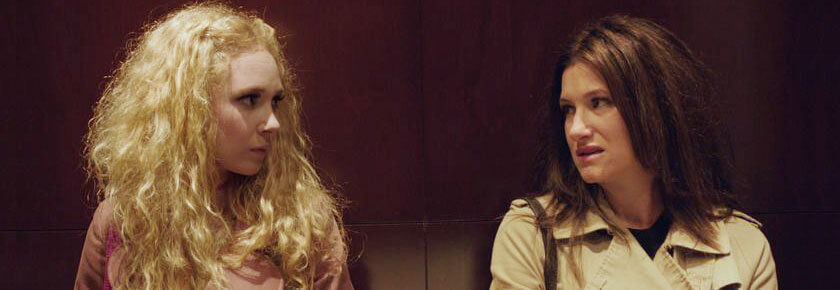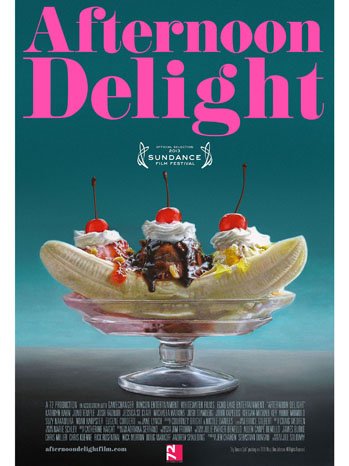

Movies
Sex Workers and Hollywood: How Afternoon Delight Flips the Script
Hollywood likes its sex workers damaged and pitiful, but writer-director Jill Soloway’s first feature portrays a different kind of stripper.
This article was made possible because of the generous support of DAME members. We urgently need your help to keep publishing. Will you contribute just $5 a month to support our journalism?
Writer-director Jill Soloway did what Hollywood has failed to do for decades. She portrayed a complex sex worker who enjoys what she does for a living and doesn’t die.
Take the scene in Afternoon Delight where the young, blonde stripper McKenna (Juno Temple) swims with bored hipster-mom Rachel (Kathryn Hahn). She tells Rachel, “I’m not the kind of girl who says she’ll strip but not get naked, or she’ll get naked but she won’t do oral. I’m up for anything. I’m a full service sex worker.” Then McKenna casually dives underwater like she just told Rachel she spray tans and teaches yoga.
Afternoon Delight bucks the norm because Soloway depicts a confident sex worker who’s a whole person—both maternal and sexual with a sex-positive approach to her work. McKenna is a caring girl who wants to do good and an enterprising stripper with real problems. Then, like all flawed characters we love, she screws up.
Hollywood’s habit is to show the damaged sex worker looking for Captain Save-a-Ho. We’ve seen the zombie-stripper Jane in the movie Closer and the grifter-hooker Alabama in True Romance. We cheered while moneyed hunk Richard Gere rehabilitated Julia Roberts in Pretty Woman, and we’ve fetishized the masochistic hooker Catherine De Neuve in Belle De Jour. Hollywood likes their strippers sad and needy, dead or reformed. Unless they repent, sex workers, like the first girl who shows her boobs in a horror movie, must always be punished.
Soloway is no stranger to flouting convention. She has written and produced subversive shows such as the Emmy-award winning Six Feet Under and The United States of Tara. Afternoon Delight is her first feature film, and she took the U.S. Dramatic Director’s Award at Sundance where it was wildly popular with audiences. The film follows Rachel as she obsessively tries to save McKenna from “the life.” Rachel moves McKenna into her home without telling her techie-hipster hubby (Josh Radnor of How I Met Your Mother), which results in a squirmy and often painful situation.
My decades-long career in the sex industry intrigued Soloway. She read my memoir, Spent (currently on a few agents’ desks), about my complicated former life as a stripper, sensual massage girl and occasional escort while my mother battled cancer. Soloway passed it along to Temple for her own research, then hired me as a technical consultant. We dove into the emotional underpinnings of certain scenes in Afternoon Delight. For instance: How would it look and feel for Rachel to watch McKenna turn a trick?
 By the way, Soloway and I had a similar experience-almost. At one point while on a walk, I told her about one of my regulars. “Have you ever taken off your clothes for money?” I asked. She hadn’t so I said, “Come with me.” She politely declined but it inspired her to write a scene where Rachel, disturbed and turned on, watches McKenna present herself to a client who’s equal shades benefactor, boyfriend and father figure.
By the way, Soloway and I had a similar experience-almost. At one point while on a walk, I told her about one of my regulars. “Have you ever taken off your clothes for money?” I asked. She hadn’t so I said, “Come with me.” She politely declined but it inspired her to write a scene where Rachel, disturbed and turned on, watches McKenna present herself to a client who’s equal shades benefactor, boyfriend and father figure.
The resulting scene looks gritty and uncomfortable, but it isn’t steeped in shame. Temple’s performance, shaped by our conversations about what it feels like to have a client you like romantically, is all charm and in charge.
In general, Soloway was willing to break the rules. She allowed me to cast actual strippers and fetish models to play topless dancers, which added a heated vibe to the strip club scene. As a filmmaker, she presented an usual optimism: What if McKenna turned tricks for a living and remained sane and intact? Throughout the film, Soloway kept to her rules: No one was going to die and no one would be betrayed, the usual punishment routine be damned.
In conversation later about where Afternoon Delight fits in the canon of sex worker films, Soloway said, “I wanted to make a piece of popular entertainment that took the conversations that feminists are having about things like porn, strippers, mistresses and choice and put them into the characters’ voices.” She also wanted to show that women have many dynamic identities that don’t have to be considered opposites. “In our culture, women are so turned against one another. We almost increase the objectification by making objects of each other. ‘She’s a ho, she’s a housewife, she’s a working mom, she’s a slut.’ I like the idea of allowing women to see themselves in one another.”
Soloway doesn’t box McKenna in by glorifying her or underestimating her, which is one of the many things that makes Afternoon Delight both liberating and important. The first time I saw the film post-production was at the Sundance premiere. I was overwhelmed with joy. For once, I didn’t have to turn away, embarrassed not by the sex but by the falseness of it all. This time I watched sex workers on screen, looking and acting like the complex people we actually are.
Before you go, we hope you’ll consider supporting DAME’s journalism.
Today, just tiny number of corporations and billionaire owners are in control the news we watch and read. That influence shapes our culture and our understanding of the world. But at DAME, we serve as a counterbalance by doing things differently. We’re reader funded, which means our only agenda is to serve our readers. No both sides, no false equivalencies, no billionaire interests. Just our mission to publish the information and reporting that help you navigate the most complex issues we face.
But to keep publishing, stay independent and paywall free for all, we urgently need more support. During our Spring Membership drive, we hope you’ll join the community helping to build a more equitable media landscape with a monthly membership of just $5.00 per month or one-time gift in any amount.


















































































